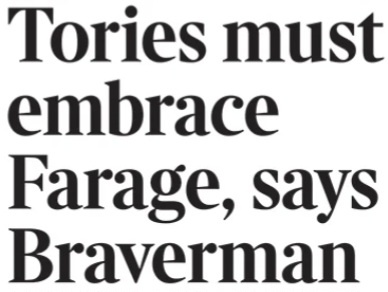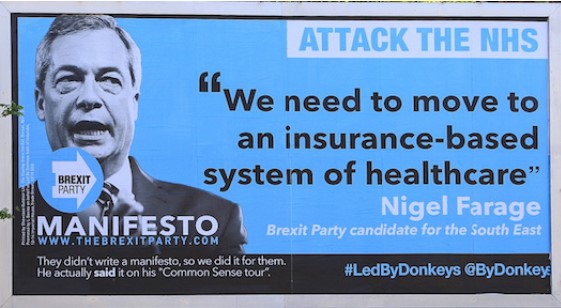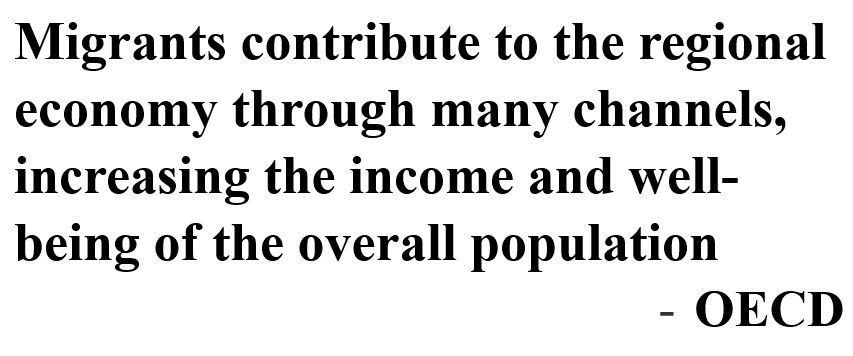Rishi Sunak is staring down the barrel of the biggest Tory defeat in more than a century. Most of the first policy initiatives he announced appealed only to solid Conservative voters and the over 65s, the only age demographic where the Tories lead in the polls. His strategy seems to be aimed solely at shoring up support in Tory seats with big majorities, which are the only places he is visiting.
Sunak’s proposal for National Service for over-18s went down like a lead balloon among most of the population, the exception being aged ex-service personnel. But then any gains he might have made in this small group were swiftly negated by his decision to cut short his visit to France on the D-day commemoration.
His latest appeal to the Tories’ base is his proposal to limit welfare and sickness benefits. Most of those in work value their right to take days off sick when they must, and where the trade union movement has established it as a norm, it quite rightly should mean sickness without loss of pay.
It is one thing the rich and super-rich – those who Sunak really represents – cheering him on, but most workers will not take kindly to the suggestion that we have a ‘sick-note culture’ keeping people away from work. If anything, there are far too many workers still going in to work when they feel unwell, rather than staying off as they should.
Farage came like an Exocet missile hitting the Tory Party
If Sunak’s decision to abandon the D-day events came like a hand grenade dropped into his election campaign, the declaration by Nigel Farage that he is contesting Clacton for Reform UK came like an Exocet missile. Some polls are now showing the Tories only a few percentage points ahead of Reform and there is even discussion of a ‘cross-over’ moment, when the Tories will slip below them.
There is no doubt Reform UK will take a lot of votes from the Tories. It is too soon to suggest, as Farage is already boasting, that Reform UK is now the “official opposition” but many Tory MPs are looking over their shoulders. Sunak is so much unloved by his own MPs, particularly those on the right of the party, that they are discussing their own manifesto, should Sunak’s fall flat.
What is more likely in the longer run, particularly after a Tory demolition in the polls, is that the rump of the party will become dominated by the right wing and will move towards Reform UK. Indeed, Suella Braverman has already called for the Tories to welcome Farage, to ‘unite the right’.
Reform UK was originally created as the Brexit Party, arguing for a ‘no-deal’ Brexit, and it won a majority of seats in the UK’s final European Parliament elections in 2019 – 29 in all – although in the following UK general election it won none. It was rebranded Reform UK when the UK finally left the EU. Now, without its main battle-cry, it is a party that has positioned itself to the far right of the Tory Party.
Reform UK is a private, Farage-owned, limited company
It says much about Nigel Farage’s contempt for democratic processes that he was literally the owner of Reform UK, which is a limited company in which he has a majority of the shares. That explains how he was able so suddenly to take over the leadership and declare himself a candidate in Clacton.

Although Farage styles himself as a ‘man of the people’ and someone sticking up for the ‘little’ man and woman in the street, he is a reactionary through and through, and a threat to workers’ living standards as much as the Tories are, or more so.
Farage is clever with the rhetoric, like attacking Sunak’s ducking out of the D-day events, in a way that most workers would relate to. Sunak, he said, “didn’t understand what it [D-day] meant to people…This is your classic Winchester, Oxford, Goldman Sachs . . . Does he even meet ordinary people? I doubt it.” Yet he failed to mention that his own father was a stockbroker, that he went to a posh fee-paying school, and that his contacts got him a job as a commodities trader in the City, where he turned himself into a millionaire. He is not exactly your ‘man in the street’.
His policies are to the right of the Tories; his opposition to Human Rights laws is really only the thin end of a wedge that aims to limit workers’ rights across the board. Farage is on record as having declared his opposition to the NHS in favour of a US-style health system.
Dividing workers on ethnic and racial lines
Above all, Farage will use migration and the plight of aslyum seekers as a means to divide workers along ethnic and racial lines. The desperation of families to escape war zones and economic collapse abroad is of no consequence to this party, nor the fact that on balance migration has a net positive effect on the economy.
On the main issues which polls show workers really care about – the NHS, housing, low pay, prices, and services – Reform UK has as much to say as Rishi Sunak, which is nothing. This is a party that will be well-supported by a handful of billionaires and millionaires, including influential people in the media, to beat the drums of racism and immigration. They have a lot to say about “small boats” but nothing to say about the plight of the people in them.

There isn’t the width of a bus-ticket between the policies of Nigel Farage on one side, and Tory right-wingers like Suella Braverman, Priti Patel and Jacob Rees-Mogg on the other. When the Tory party is decimated in the polls, there will probably be a realignment of British right-wing politics, with these two trends merging.
“There’s a great deal that Reform and the Tory party have in common”, Rees-Mogg told the Financial Times, “in terms of their view of how the country should be governed, and we ought to try to work together.” In fact, a merger with this wing of the Tories is undoubtedly Farage’s long-term strategy. “The election is over, it’s done”, Farage told a press conference, when he announced his candidacy. “Labour have won, there is not a contest.” Farage’s slogan, it seems is “It’s done”…meaning the election.
The rich get richer, the poor get poorer
The complete collapse of support for the Tories is fundamentally down to the biggest hit on living standards for generations: while the rich have become immeasurably richer, the big majority are poorer, with millions of working households having to run faster and faster, just to stand still. Barely a month goes by without a new scandal affecting the government: the Post Office, tainted blood, sewage in rivers (for which CEO and shareholders are rewarded), the blatant corruption around Covid contracts, and many more.
Ask the question, “is there even one thing that is better now than it was in 2010, when the Tories came to office?” and the answer is a firm, “No”. All this was already enough to doom the Tories to the political dustbin. But the threat from Farage and Reform UK have put the lid on it.

“Could this be the end of the Conservative Party as we know it?” ask the journalists of The Guardian, and the answer must firmly be, “Yes”. In the coming few years, we will see a new political formation take shape, consisting of the right of the Tory Party and Reform UK, looking more like the right-wing populist parties of Europe or Trump’s Republican Party.
It is important that the Labour Party faces up to this threat. The success of right-wing, nationalist populist parties in the recent European Parliament elections is a warning to the labour movement. We cannot dismiss all of those who vote for the right – or even for Farage in Clacton – as reactionary bigots, even if it is true of the beneficiary of their votes.
The electoral support for right wing populism does not come out of a clear blue sky. It is part of the disintegration and decay of capitalism. It comes from a gut feeling among workers – particularly the least-well organised, the poorest paid and those in greatest economic stress – that the system is failing them. They feel no inspiration or motivation to support mainstream politicians, because “they’re all the same” – as indeed they are, in most respects.
There is a generalised perception that decisions are being taken far above their heads, by remote and anonymous bureaucrats, often in Brussels or Westminster, and that they have no say in what is happening to them. Politics is something done to them, rather than for them. They are trapped in a hurricane of social and economic problems from which the mainstream leaders offer no respite, and the only definites in their lives are uncertainty and insecurity.
In this toxic mixture, there are also fears about the unavailability of genuinely affordable housing, as well as the state of the NHS, education and public services – things on which these households depend more than average. This is the foundation on which populist parties build their support, diverting attention from the real culprits – the rich and the super-rich – to scapegoats like asylum-seekers, Muslims or other minority groups.
Reform UK will be doing their best, as the Brexit Party did – with great success – in the referendum of 2016, to turn the poll into a vote on immigration and nothing else. And in this they will find strong backing in the gutter press like the Mail, the Sun and the Telegraph.
Labour should oppose their poisonous ideas on Reform UK terms
It would be making a fundamental mistake for the Labour Party to oppose poisonous ideas like those of Reform UK on their terms. It would conceding the basic political ground to simply argue back about the numbers of migrants, as unfortunately, the Labour leaders do. The ideas of Reform UK should be opposed on a class basis.

What should be raised by Labour is the lack of alternative and safe routes available for asylum-seekers and the real causes of social problems faced by the mass of workers. And Labour should offer policies that can deal with the concrete issues that workers face.
In the next few years, British politics will increasingly resemble that of France, Italy and Germany, where a hard right political party uses migration and ethnic division as a spear point, ultimately directed at the heart of organised labour. It is a prospect that the workers’ movement needs to tackle head on.
It is not going to happen under the baleful leadership of Keir Starmer, who is as much wedded to the capitalist system as any LibDem, Tory, or, for that matter, Nigel Farage. But what socialists have to fight for, particularly in the affiliated unions, is a Labour Party that advances real socialist policies that would seriously and meaningfully tackle the housing crisis, low pay and the dilapidation of the NHS and other services. These are the only policies that can cut the ground from under the feet of the racists and xenophobes in the Conservative and Reform UK parties.
The warning to the Labour movement that is imparted in the gains for the populist right in the recent European Parliamentary elections is doubly important under Labour. If an incoming Labour administration offers only more austerity, even in the guise of “tough decisions”, it will give an added impetus to whatever political shape the new British populist right assumes.
Workers have a natural tolerance of others and show mutual support and solidarity within their communities, but especially in workplaces. Most workers are sympathetic to the plight of those who have become so desperate to escape danger that they risk their lives and their families’ lives in dangerous Channel crossings.
But such expressions of toleration and support are predicated on a labour movement that is actively working in their favour and in their interests. Labour policies must have as their starting point, the resolution of the social and economic problems of workers, and that inevitably means challenging the wealthy, the billionaire press, the financial parasites in the City and the entire capitalist system they represent. That is the way to deal the danger of division that comes from Reform UK or its future manifestations.



